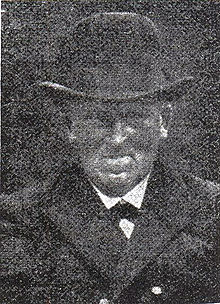Wilhelm Weißbrodt
Wilhelm Weißbrodt (born May 1, 1836 in Sayn , Rhineland; † November 9, 1917 in Braunsberg , East Prussia) was a German classical philologist.
Live and act
Weißbrodt attended grammar school in Trier until 1857 and then initially studied Catholic theology. From 1863 he studied classical philology at the Theological and Pedagogical Academy in Münster , where he received his doctorate on April 16, 1869 with a dissertation on the development of consonant doubling in Latin under Franz Winiewski . In September 1869 Weissbrodt became an associate professor of philology at the Philosophical Faculty of the Lyceum Hosianum in Braunsberg, and from 1873 until his death he was a full professor there. There he began to build an "Antique Archaeological Cabinet" which, in addition to casts, included numerous antique inscriptions and small finds.
Publications
- Specimen grammaticum , Koblenz 1869 (= dissertation)
- Miscellanea epigraphica, numismatica, grammatica , Braunsberg 1883
- The archaeological collection at the Royal Lyceum Hosianum , Braunsberg 1892
- An Egyptian Christian tombstone with an inscription from the Greek liturgy in the Royal Lyceum Hosianum zu Braunsberg and similar monuments in foreign museums , 2 vols. Braunsberg 1905 u. 1909
- Greek and Latin inscriptions in the ancient archaeological collection of the Royal Academy in Braunsberg , Braunsberg 1913
literature
- Bertram Faensen: The "Antique Archaeological Cabinet" at the Lyceum Hosianum in Braunsberg (Braniewo). From the history of the ancient collection and the chair for classical philology at a Catholic university in Warmia . In: Pegasus. Berlin contributions to the afterlife of antiquity , Vol. 2 (2000), pp. 61–87, ISSN 1436-3461 ( PDF )
- Gunnar Anger: WEISSBRODT, Wilhelm. In: Biographisch-Bibliographisches Kirchenlexikon (BBKL). Volume 25, Bautz, Nordhausen 2005, ISBN 3-88309-332-7 , Sp. 1463-1465.
Web links
- Literature by and about Wilhelm Weißbrodt in the catalog of the German National Library
| personal data | |
|---|---|
| SURNAME | Weißbrodt, Wilhelm |
| BRIEF DESCRIPTION | German classical philologist |
| DATE OF BIRTH | May 1, 1836 |
| PLACE OF BIRTH | Sayn |
| DATE OF DEATH | November 9, 1917 |
| Place of death | Braunsberg |
